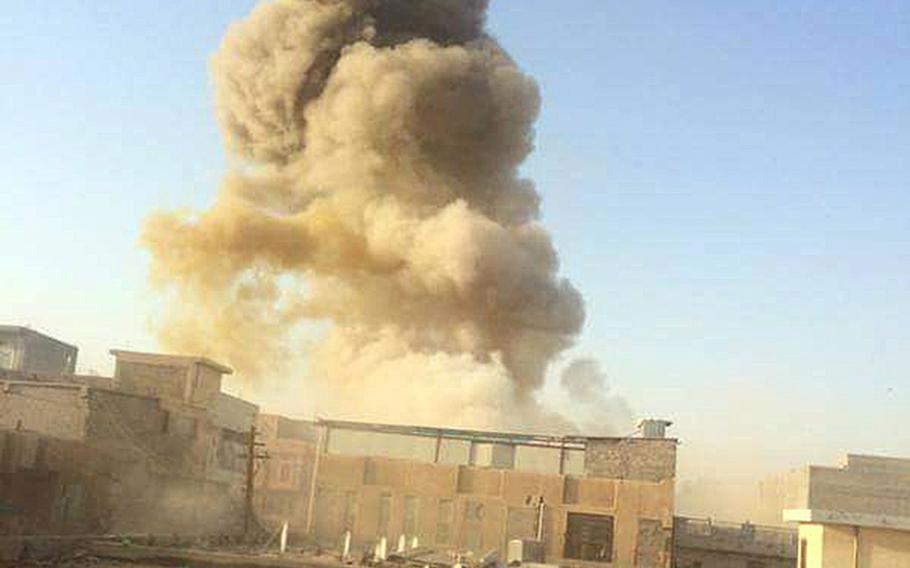
An Islamic State car bomb explodes at the gate of a government building near the provincial governor's compound in Ramadi, Iraq, on Saturday, May 16, 2015, during heavy fighting that saw most of the city fall to the militants. (Stringer, McClatchy DC/TNS)
WASHINGTON — U.S. Central Command on Friday downplayed a rash of Islamic State attacks in the Middle East, again maintaining that the hardline Islamist group remains on the defensive.
Col. Pat Ryder, a CENTCOM spokesman, said a twin car-bombing that killed 15 people late Thursday in Baghdad shows the Islamic State has only a limited capability to attack the Iraqi capital. He said a bombing Friday at a Shiite mosque in Saudi Arabia may not have been carried out by the Islamic State.
The Islamic State claimed responsibility for both the Baghdad bombings and the Saudi attack, the second against a Shiite mosque in the kingdom in a week. Four people were killed in the Friday Saudi blast.
Despite the Islamic State's claim, Ryder told reporters at the Pentagon that it was unclear who was responsible and that some militants claim affiliation with the Islamic State simply because it’s the “popular terrorist group of the month.”
On May 15, Marine Brig. Gen. Thomas Weidley, chief of staff of Combined Joint Task Force-Operation Inherent Resolve, told Pentagon reporters that “we firmly believe (the Islamic State) is on the defensive throughout Iraq and Syria.” As he spoke, the Islamic State was launching a major attack on the Iraqi city of Ramadi, which was well within two days after the Iraqi army fled the city.
That triggered an outcry from critics in Congress and elsewhere that the U.S. military was sugar-coating the situation in Iraq.
Critics have also expressed growing skepticism over the effectiveness of the U.S. air campaign and the overall war effort that began in August to degrade and destroy the Islamic State.
On Friday, the Islamic State branch in Libya seized the airport in the late Moammar Gadhafi’s hometown of Sirte as part of an ongoing offensive there.
Nevertheless, Ryder said that “when we look at the entire battlefield,” the command thinks “ISIL is on the defensive compared to where they were a year ago.” ISIL is one of several acronyms for the Islamic State.
He said the Islamic State has lost terrain, large amounts of equipment, combat power, leaders and the ability to generate revenue through oil.
“Nobody is saying there is not a lot of work still to be done, and nobody is saying this isn’t going to be a tough fight,” he said.
He said the bombings in Baghdad were “an example of the limited nature or scope of the kinds of attacks that ISIL is able to do in that area.”
Ryder insisted that the U.S. had “no information to indicate the ISIL is a threat in Saudi Arabia.”
“In some cases, we have seen other groups that have sort of tried to act as franchises if you will or rebrand themselves under the ISIL banner because they are the popular terrorist group of the month.”
But a Saudi Interior Ministry official, Bassam Attiyah, told state television this week that the Islamic State was planning to attack security forces, Saudi Shiites and foreigners in the kingdom.
Meanwhile, the U.S. air campaign in Iraq drew public criticism this month. Sen. John McCain, R-Ariz., said the campaign was ineffective and that 75 percent of U.S. and coalition sorties return without dropping ordnance on a target. Fox News quoted anonymous military pilots who said they were frustrated because air strikes were not authorized quickly enough.
Ryder said CENTCOM disagrees with critics and that strikes can be carried out within minutes if appropriate.
“It is more important for us to accurately target the enemy with a high degree of precision in order to minimize civilian casualties than it is to strike with such speed or force that it would risk disenfranchising the very population we are there to protect in some cases,” he said.
On Friday, a reporter questioned Ryder on why the Pentagon’s description of the war against the Islamic State — particularly developments on the ground this week — has appeared to differ significantly with other accounts.
“I don’t see from my perspective that there is a disconnect so much as a difference in perspective,” Ryder said.
tritten.travis@stripes.com Twitter: @Travis_Tritten